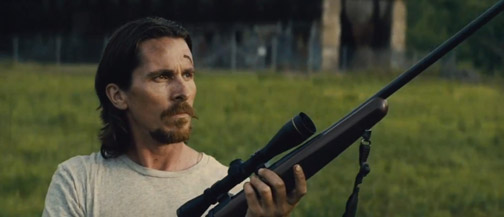Movie Review: Out of the Furnace
By Matthew Huntley
December 10, 2013
BoxOfficeProphets.com

The story takes place in the dilapidated and all but forgotten borough of Braddock, Pennsylvania, which sits just on the outskirts of Pittsburgh. Based on my recent travels in this area, I imagine the production designers and art directors didn’t have to do a whole lot of dressing up to give the film a sense of rawness and authenticity. However, they certainly did their job when it came to location scouting.
Braddock is the type of northeast city where the streets abound with loose stone, overgrown weeds, potholes and oil stains; where the weather is always partly cloudy; and where empty buildings and houses exist in one’s periphery. Here, the people are hardworking and loyal, but when you ask them how they’re doing, their response is most likely, “Oh, just doing what I can to get by.” Romantic Braddock is not, and this unidealistic quality gives the film a cold atmosphere and hard truth.
In this town lives a pair of brothers, Russell (Christian Bale) and Rodney Baze (Casey Affleck). Russell, with his long hair, neck tattoo and unruly goatee, has followed in his father’s footsteps and works in the steel mill, which has a limited lifespan, but he firmly believes “there’s nothing wrong with working for a living.” He’d be happy if life simply stayed its course and, along with his girlfriend Lena (Zoe Saldana), all he had to do was maintain it.
Rodney, on the other hand, is more restless. He’s a soldier in the army who’s about to depart on his fourth tour of Iraq (the film starts out in 2008). When he’s not serving his country, he’s struggling to pay off his debts, and indeed we first meet him at a run-down betting house. Despite his bad habits and naïve nature, Russell loves the kid, and with their father on his death bed and their Uncle Red (Sam Shepard) growing older, he inevitably feels the need to watch over him.
That’s not to say Russell is perfect. A tragic accident sends him to prison and upon his release, he finds Rodney angry, out of work and shell-shocked. While Russell was locked up, he partnered with John Petty (Willem Dafoe), who owns a local bar that serves as a front for his underground gambling ring. Petty manages Rodney as a bare-knuckled fighter, which Rodney seems to think is the only way he can pay off his deficits and manage his aggression. He knows there’s more money to be made by fighting the Appalachian locals in New Jersey, whom Petty refers to as “inbreeds.” They’re run by a drug dealer named Harlan DeGroat (Woody Harrelson), who is your textbook scumbag with a very short fuse, as we see him display in the film’s opening scene. Rodney and Petty’s encounter with DeGroat leads them down a path that eventually forces Russell to consider his own future and put everything he knows - including his morals and values - on the line.
That’s the basic plot of Out of the Furnace, and it’s a serviceable one, but I don’t think it’s something Cooper really believed in or cared about, and in turn, neither do we. It’s as though he simply needed to give his characters something to do while he watched them deal with their hapless circumstances, which is much more interesting. Beneath the “what happens in it” aspect of the film are some effective explorations of human behavior, character development and strong, nuanced performances, especially from Bale and Affleck. Watching Russell and Rodney come to terms with their own shortcomings, as well as more widespread issues like war, the economy, and the idea of being trapped by limited opportunities and familial responsibilities, makes certain parts of the story really hit home.
For these reasons and more - its atmosphere, its patience, its honesty - Out of the Furnace is worth seeing. It reminded me of Ulee’s Gold, another drama about a hard-working man who has to take the lead and clean up after his family, and not because he wants to, but because they’re his family. The difference between the two is the filmmakers behind Ulee’s Gold made the plot secondary to simply just observing the characters in their given situation. With Out of the Furnace, there’s too much negotiating between the two. The result is a good film whose individual scenes are better than the movie as a whole, which suggests it could have been great.